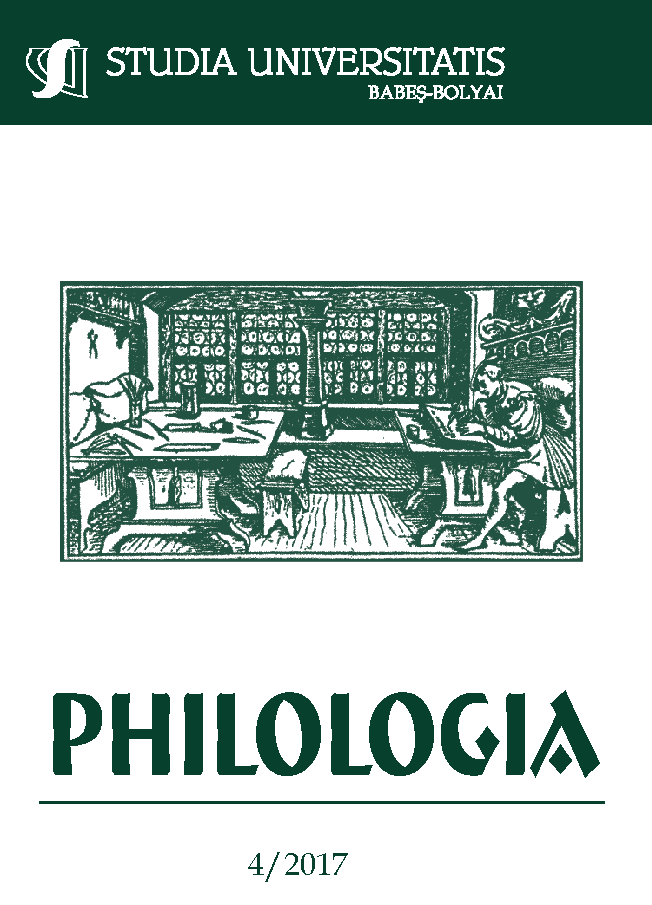ESTRATÉGIAS DE APRENDIZAGEM E DESEMPENHO ORAL: ESTUDO DE CASO
DOI:
https://doi.org/10.24193/subbphilo.2017.4.08Keywords:
Portuguese foreign language. Portuguese second language. Foreign language learning. Second language learning. Language learning strategies. Speaking.Abstract
Language learning strategies and oral performance: a case study. This article presents the results of a quantitative analysis on the link between (1) the use of language learning strategies (LLS) and (2) the oral performance among beginner students of the Portuguese for Foreigners Course at University of Porto, in the 2014-2015 academic year. The findings are: there is a positive correlation, but not significant, between (1) and (2), and students with the best results in the oral assessment have higher means in the LLS use, use more LLS in high frequency level and over-perform on the use of specific LLS.
Rezumat. Strategii de învățare în exprimarea orală: un studiu de caz. Acest articol prezintă rezultatele unei analize cantitative a relației dintre (1) folosirea strategiilor de învățare a unei limbi străine (SÎLS) și (2) evaluarea exprimării orale în rândul studenților de nivel începător de la cursul de portugheză pentru străini de la Universitatea din Porto din anul universitar 2014-2015. Rezultatele studiului sunt următoarele: se observă o corelație pozitivă, dar nu semnificativă, între (1) și (2). Studenții cu cele mai bune rezultate la evaluarea orală folosesc mai eficient SÎLS, folosesc mai multe SÎLS și mai frecvent și au performanțe ridicate în folosirea unor dintre aceste strategii.
Cuvinte cheie: portugheza ca limbă străină, portugheza ca limbă nematernă, învățarea limbilor străine, învățarea limbilor nematerne, exprimare orală
References
Baptista, L. C. (2016). O uso de estratégias de aprendizagem e a competência oral entre alunos do nível A1.2. Dissertação de Mestrado. Faculdade de Letras. Universidade do Porto. Disponível em:https://repositorio-aberto.up.pt/bitstream/10216/83779/2/132701.pdf. [último acesso em 17 abr. 2017]
Chamot, A. U. (2005). “Language learning strategy instruction: current issues and research”. Annual Review of Applied Linguistics, 25, 112-130. doi:http://dx.doi.org/10.1017/S0267190505000061. [último acesso em 17 abr. 2017]
Conselho da Europa (2001). Quadro Europeu Comum de Referência para as Línguas: aprendizagem, ensino, avaliação. Porto: Edições ASA.
Griffiths, C. (2013). The strategy factor in successful language learning. Bristol: Multilingual Matters.
Leiria, I. (2004). Português língua segunda e língua estrangeira: investigação e ensino. Disponível em: http://cvc.instituto-camoes.pt/idiomatico/03/portuguesLSeLE.pdf. [último acesso em 16 abr. 2017]
Oxford, R. L. (1990). Language learning strategies: what every teacher should know. Boston: Heinle & Heinle.
Oxford, R. L. (1994). Language learning strategies: an update. Disponível em: http://www.ericdigests.org/1995-2/update.htm. [último acesso em 16 abr. 2017]
Oxford, R. L. (2011). Teaching and researching language learning strategies. Harlow: Pearson Longman.
Rubin, J. (1975). “What the good language learner can teach us”. TESOL Quarterly, 9(1), 41-51. doi: 10.2307/3586011. [último acesso em 16 abr. 2017]
Rummel, R. J. (1976). Understanding correlation. Disponível em: https://www.hawaii.edu/powerkills/UC.HTM . [último acesso em 16 abr. 2017]
Downloads
Published
How to Cite
Issue
Section
License
Copyright (c) 2017 Studia Universitatis Babeș-Bolyai Philologia

This work is licensed under a Creative Commons Attribution-NonCommercial-NoDerivatives 4.0 International License.





 ©Studia Universitatis Babeş-Bolyai Philologia. Published by Babeș-Bolyai University.
©Studia Universitatis Babeş-Bolyai Philologia. Published by Babeș-Bolyai University.